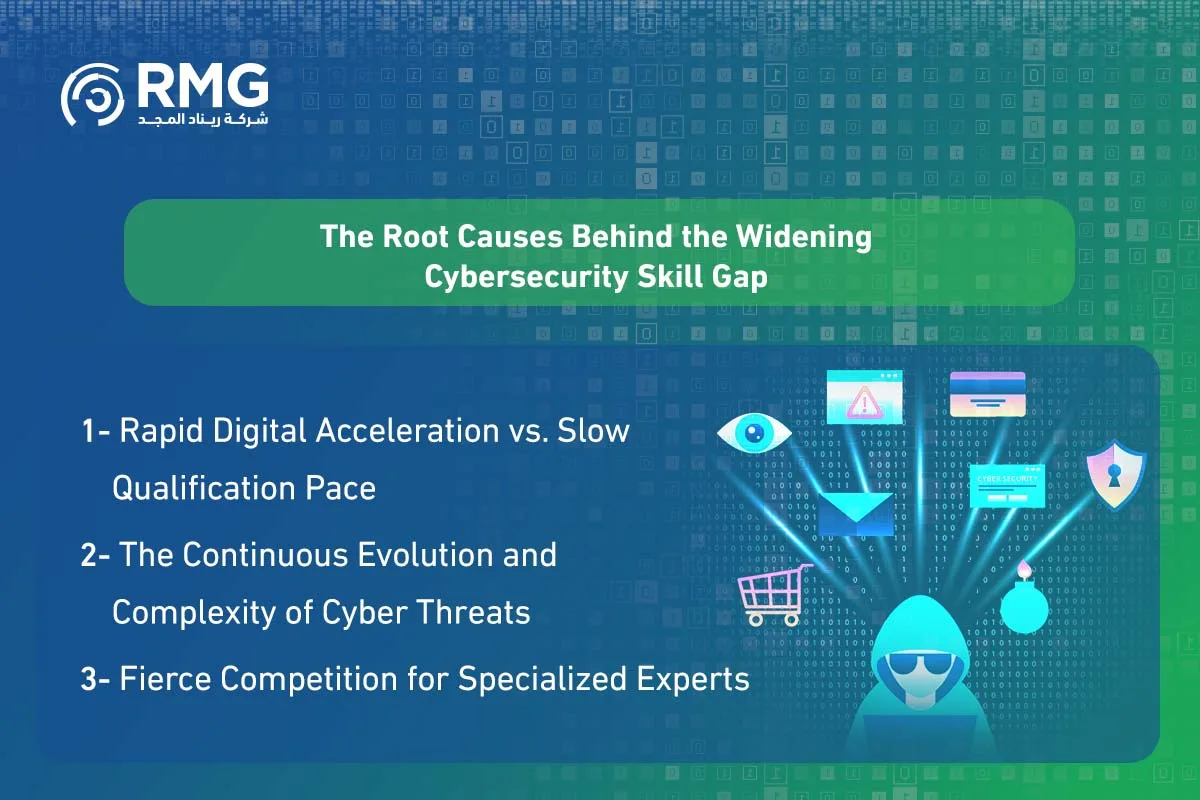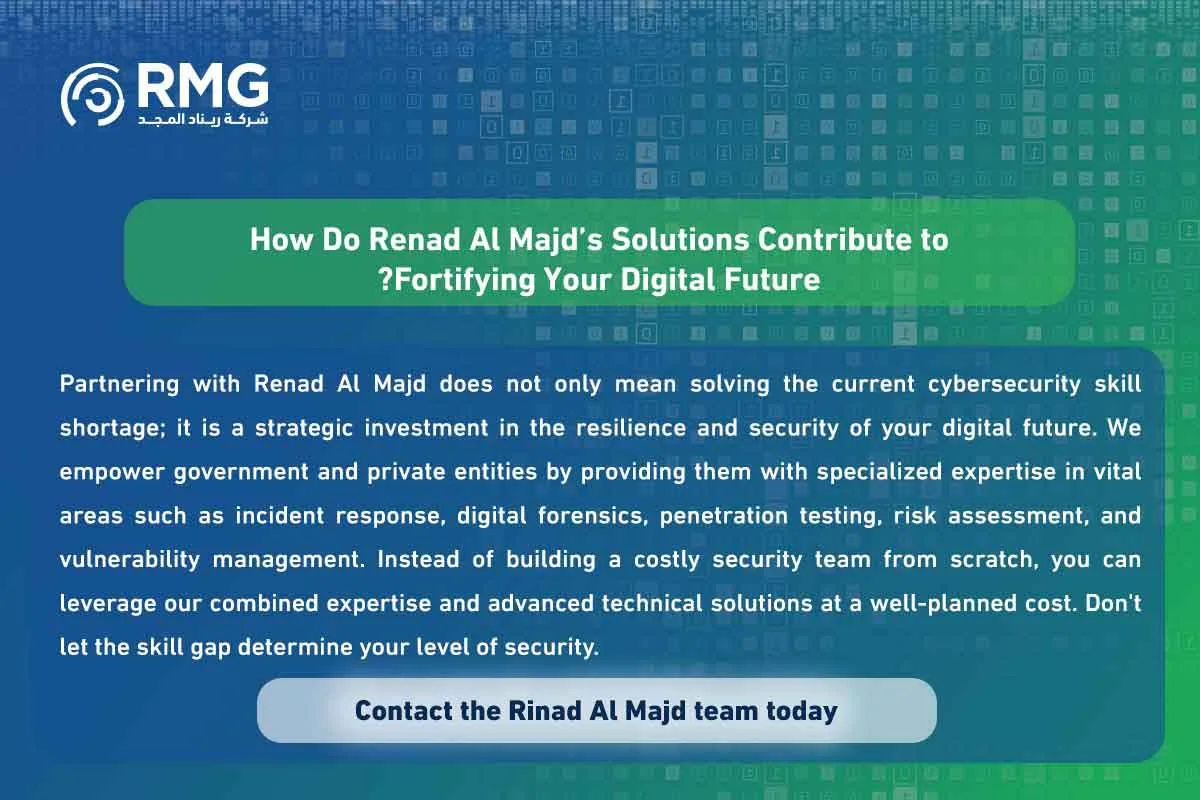Blog Body
Is the cybersecurity skill shortage threatening your organization’s security? Discover the true dimensions of this gap in the Kingdom, its impact on business continuity, and learn about the innovative strategic solutions offered by Renad Al Majd (RMG) to close this critical vulnerability and fortify your digital assets.
What is the Cybersecurity Skill Shortage and Why Does It Represent a Silent Crisis?
At the heart of the accelerating digital transformation in the Kingdom of Saudi Arabia lies a critical gap that may be the greatest obstacle to achieving sustainable security: the cybersecurity skill shortage crisis. This term isn’t limited to mere job vacancies; it represents a state of severe imbalance between the immense and growing demand for skilled cybersecurity experts and the limited supply of talent capable of facing advanced and evolving threats. This gap isn’t just a recruitment challenge—it’s a strategic vulnerability in the first line of defense for both government and private institutions, leaving the doors open to attacks that target sensitive data and critical infrastructure. Understanding the dimensions of this shortage is the first step toward building an integrated, resilient defense strategy against future risks.
The Impact of the Cybersecurity Talent Shortage on the Kingdom’s Digital Economy
The Saudi digital economy is on the cusp of unprecedented growth, driven by ambitious initiatives and mega-projects. However, this growth is intrinsically linked to the ability to secure it. Here, the cybersecurity skill shortage casts a heavy shadow, causing serious repercussions that go beyond individual security incidents.
- Hindering Innovation and Digital Transformation: Many organizations are hesitant to adopt new technologies like cloud computing, artificial intelligence, and the Internet of Things (IoT) due to the lack of qualified teams to secure these technologies effectively. This hesitation leads to a slowdown in the pace of innovation and the loss of a vital competitive advantage.
- Increased Operational Costs: When finding talent becomes difficult, recruitment costs and salaries rise significantly. Furthermore, relying on incomplete or overworked teams increases the likelihood of costly security incidents, whether in terms of direct financial losses or the costs of reputation and data recovery.
- Undermining Trust in Digital Services: Trust is the cornerstone of the digital economy. Any major security breach resulting from a skill shortage can erode the confidence of customers and investors in the entire digital ecosystem, negatively affecting investments and targeted growth.
The Root Causes Behind the Widening Cybersecurity Skill Gap
To understand how to address this problem, we must analyze its deep-seated causes. The cybersecurity skill shortage is not a coincidence; it’s the result of several complex factors that work to widen the gap day by day.
- Rapid Digital Acceleration vs. Slow Qualification Pace: The Kingdom and its private sector have adopted digital technologies at a very fast pace, creating a vast and complex digital environment. In contrast, academic education and professional training are still struggling to keep up with this rapid development. Curricula may not always reflect the latest threats and defensive technologies, resulting in graduates who need additional and intensive training before they become fully productive in a real work environment.
- The Continuous Evolution and Complexity of Cyber Threats: Cybersecurity is no longer limited to fighting traditional viruses. Today, organizations face sophisticated ransomware attacks, Distributed Denial-of-Service (DDoS) attacks, complex social engineering attacks, and Advanced Persistent Threats (APTs) that are often state-sponsored. Each of these threat types requires a specialized skill set to analyze, contain, and counter it, which makes it more difficult to find experts with the required comprehensive knowledge.
- Fierce Competition for Specialized Experts: Qualified and experienced cybersecurity talent is a rare and globally sought-after commodity. Saudi organizations find themselves in fierce competition not only with other local companies but also with major global corporations that offer enticing salary packages and benefits. This competition makes it difficult for many entities, especially small and medium-sized ones, to attract and retain the best expertise, which exacerbates their cybersecurity skill shortage problem.
The Risks of Neglecting the Cybersecurity Skill Gap: What Threatens Your Organization?
Ignoring the cybersecurity skill shortage is no different from building a fortified castle and leaving its gates unguarded. The risks associated with this neglect are direct and have a devastating impact on business continuity and reputation.
- Increased Vulnerability to Successful Cyberattacks: The simplest equation in cybersecurity is that an attacker only needs to find one vulnerability, while the defender needs to secure everything. With an incomplete or under-skilled security team, the probability of attackers succeeding in exploiting vulnerabilities increases, leading to data theft, service disruption, and extortion.
- Slow Incident Response Time: When an attack occurs, every minute is critical. Teams suffering from a skill shortage take longer to detect the attack, understand its nature, contain it, and recover from it. This delay significantly multiplies the financial and operational damage.
- Exorbitant Financial Costs and Legal Liability: The costs of a security breach go beyond direct losses. They include the costs of digital forensic investigation, potential regulatory fines from legislative bodies, the costs of restoring systems and data, in addition to the intangible losses related to brand reputation and customer trust that may take years to build.
Renad Al Majd (RMG): Your Strategic Partner to Bridge the Cybersecurity Skill Gap
Recognizing the seriousness of this challenge facing organizations in the Kingdom, Renad Al Majd (RMG) offers an innovative model that goes beyond traditional recruitment solutions. We don’t just provide employees; we provide integrated solutions specifically designed to immediately and effectively bridge the cybersecurity skill shortage. Through our Managed Security Services (MSSP) and advanced consulting services, we provide our clients with direct access to an elite team of cybersecurity experts and analysts who work as an extension of their internal teams. This model ensures your organization gets the 24/7 protection it needs, without the burden and costs of searching for, training, and retaining rare talent, allowing you to focus on your core business objectives with confidence and security.
How Do Renad Al Majd’s Solutions Contribute to Fortifying Your Digital Future?
Partnering with Renad Al Majd does not only mean solving the current cybersecurity skill shortage; it is a strategic investment in the resilience and security of your digital future. We empower government and private entities by providing them with specialized expertise in vital areas such as incident response, digital forensics, penetration testing, risk assessment, and vulnerability management. Instead of building a costly security team from scratch, you can leverage our combined expertise and advanced technical solutions at a well-planned cost. Don’t let the skill gap determine your level of security.
Contact the Renad Al Majd team today to explore how we can design a customized solution that meets your unique security needs and turns your greatest challenge into your strongest defensive asset.






















